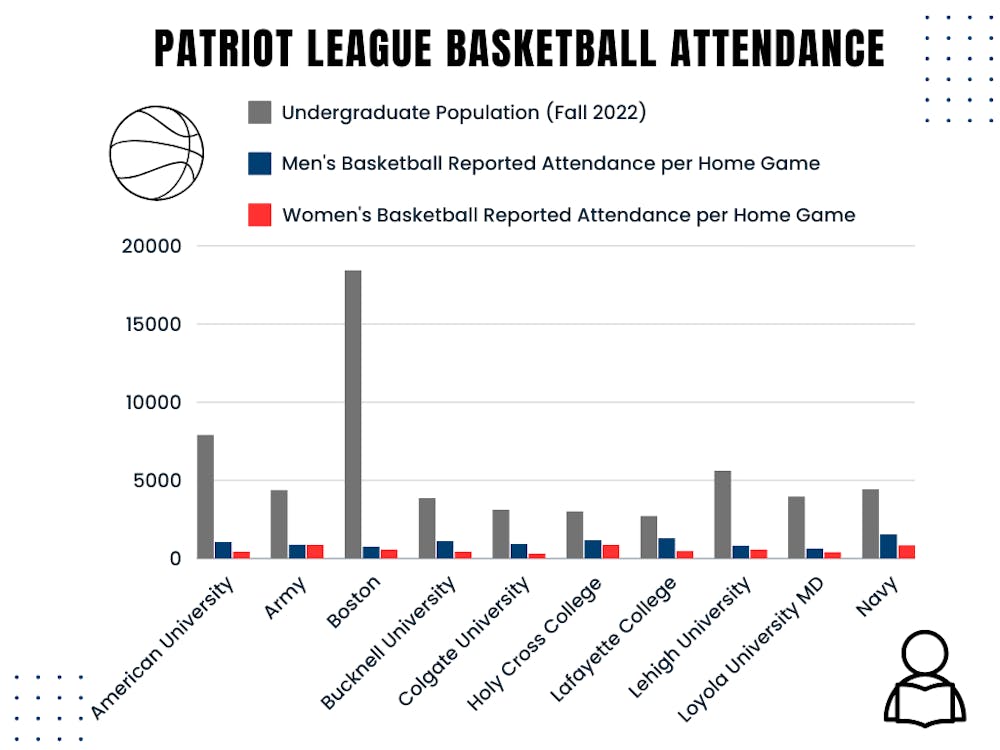In the land of political and academic wonks, American University culture is not typically classified as being dominated by die-hard Eagle sports enthusiasts.
Without the all-American sports of football and baseball, basketball is the primary headliner sport for Eagle fans to attend, throughout both the late fall and early spring semesters.
Since the basketball programs are the main sports draw of the student body, the attendance trends of both the men’s and women’s basketball teams can represent AU’s sports and school spirit culture.
AU’s total reported attendance for the men’s basketball program was clocked at 15,907 for the 2023-24 season, while the women’s program reported 6,789. Putting these figures into perspective, powerhouse champions like the South Carolina Gamecocks women’s basketball team meanwhile reported an astounding total attendance of 273,133 in 2023-24 and the University of Connecticut Huskies men’s team recorded 203,722 attendants.
These wildly successful public university basketball programs unsurprisingly outclass AU’s attendance numbers, thanks to their larger student bodies, larger arenas, intense matchups and rich program histories. However, it does raise questions about how AU shapes up against comparable universities amidst the Patriot League conference.
Using total attendance numbers and number of home games reported on each team’s athletic websites, the average of attendants per game can be calculated for each PL member school.
AU ranks in the middle of men’s basketball, having an average of 1,060.5 fans in attendance per home game. AU’s average is behind Navy, Lafayette, Holy Cross and Bucknell. However, AU’s total attendance on the year was ranked fourth out of the 10 Patriot League schools, beating out Bucknell, likely due to hosting one more home game than the Bisons.
Gaby Waksburg, a junior in the School of Communication, is an AU Blue Crew student leader who worked home games for both basketball teams.
“That’s honestly a little shocking. But at the same time when I really think about it, it kind of makes sense. I would expect us to kind of land in the middle, because we’re not a very big sports school,” she said of the men’s basketball attendance ranking fourth.
“None of the Patriot League strike me as crazy sports-invested schools, other than Army [or] Navy,” Waksburg said.
Navy’s attendance per home game and overall attendance figure was the highest reported for men’s basketball, but Army’s numbers fell behind AU’s. The student body of Army West Point showed higher attendance rates for women’s basketball than Navy.
Women’s basketball home attendance was calculated to be below-median at only 452.60 fans averaged per home game. This puts AU just ahead of Colgate, Lafayette and Loyola Maryland for the lowest attendance averaged.
Despite being middle-to-below-averages across both team’s total attendance figures, AU’s undergraduate population is the second largest among Patriot League schools with 7,917 reported undergraduates, coming second to Boston University’s near-double number of undergraduates reported in 2022.
When accounting for school populations, the percentage of students who attend home games on average can be calculated, assuming a steady rate of undergraduate population carrying over into 2023.
For both men’s and women’s basketball, AU ranks the second lowest percentage of attendants per total undergraduate population, once again behind BU.
Lafayette’s men’s team and Holy Cross’s women’s team had the highest percentage of student body attending their games on average. This may be unsurprising as both teams were successful during PL play, with the men’s Lafayette Leopards being one of the teams in the four-way tie of second place and the women’s Holy Cross Crusaders winning the Patriot League and advancing to the NCAA tournament, though losing to the Iowa Hawkeyes in the first round.
However, the men’s teams of American, Bucknell and Boston were the other legs of the four-way tie for second in the Patriot League, all without being in the top percentages of average attendants per undergraduate population.
“I think it’s obviously more fun and people want to come back if we win,” Waksburg said, “But I don’t really notice a difference, especially in conference play … whether the crowds are bigger when we’re winning or smaller.”
Waksburg points out there was a large crowd of Eagles fans in attendance for the men’s team’s final game in the Patriot League tournament versus Bucknell.
“I think that people were excited that we seeded not at the bottom, and so that brought people,” she said.
The causes of AU’s lower attendance may fit in with pre-existing notions of a lack of school spirit, specifically to sports. The prevalence of off-campus housing and AU’s location in D.C. may also be factors, Waksburg said
“We have a pretty good location compared to a lot of other Patriot League schools,” she said.
These factors of metro-area locations and high off-campus housing rates are shared between AU and Boston University, which both have lower attendance rates despite team successes. The opportunities within a larger city could allow for alternatives for students to bond within their communities other than at sporting events.
Despite these lower attendance figures, AU sports and the student-run Blue Crew have found success in promoting community involvement through themed games and student involvement events due special home games across all sports.
“When we have our Black History Month games and there are student performers, there are always big crowds to see them,” Waksburg said, also emphasizing the high attendance at Club Sports Nights. “I definitely see a difference between [weeknight games with] themes and non-theme or non-student involvement.”
This article was edited by Penelope Jennings, Delaney Hoke and Abigail Turner. Copy editing by Luna Jinks and Isabelle Kravis.





